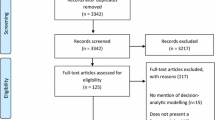Abstract
Decision-analytic models play a key role in informing healthcare resource allocation decisions. However, there are ongoing concerns with the credibility of models. Modelling methods guidance can encourage good practice within model development, but its value is dependent on its ability to address the areas that modellers find most challenging. Further, it is important that modelling methods and related guidance are continually updated in light of any new approaches that could potentially enhance model credibility. The objective of this article was to highlight the ways in which qualitative methods have been used and recommended to inform decision-analytic model development and enhance modelling practices. With reference to the literature, the article discusses two key ways in which qualitative methods can be, and have been, applied. The first approach involves using qualitative methods to understand and inform general and future processes of model development, and the second, using qualitative techniques to directly inform the development of individual models. The literature suggests that qualitative methods can improve the validity and credibility of modelling processes by providing a means to understand existing modelling approaches that identifies where problems are occurring and further guidance is needed. It can also be applied within model development to facilitate the input of experts to structural development. We recommend that current and future model development would benefit from the greater integration of qualitative methods, specifically by studying ‘real’ modelling processes, and by developing recommendations around how qualitative methods can be adopted within everyday modelling practice.
Similar content being viewed by others
References
Coast J. The appropriate uses of qualitative methods in health economics. Health Econ. 1999;8(4):345–53.
Obermann K, Scheppe J, Glazinski B. More than figures? Qualitative research in health economics. Health Econ. 2013;22:253–7.
Sculpher MJ, Claxton K, Drummond M, McCabe C. Whither trial-based economic evaluation for health care decision making? Health Econ. 2006;15:677–87.
Petrou S, Gray A. Economic evaluation using decision analytical modelling: design, conduct, analysis, and reporting. BMJ. 2011;342:d1766.
Caro JJ, Briggs AH, Siebert U, Kuntz KM. Modeling good research practices: overview. A report of the ISPOR-SMDM modeling good research practices task force-1. Value Health. 2012;15:796–803.
Philips Z, Bojke L, Sculpher M, et al. Good practice guidelines for decision-analytic modelling in health technology assessment. Pharmacoeconomics. 2006;24(4):355–71.
Penaloza Ramos MC, Barton P, Jowett S, Sutton AJ. A systematic review of research guidelines in decision-analytic modeling. Value Health. 2015;18:512–29.
Denzin NK, Lincoln YS. Introduction: the discipline and practice of qualitative research. In: Denzin NK, Lincoln YS, editors. Handbook of qualitative research. 2nd ed. Thousand Oaks (CA): SAGE Publications; 2000. p. 1–28.
Miller WL, Crabtree BF. Clinical research: a mulitmethod typology and qualitative roundmap. In: Miller WL, Crabtree BF, editors. Doing qualitative research. 2nd ed. Thousand Oaks (CA): SAGE Publications; 1999. p. 3–26.
Malterud K. Qualitative research: standards, challenges and guidelines. Lancet. 2001;358:483–8.
Silverman D. Doing qualitative research: a practical handbook. London: SAGE Publications; 2000.
Rubin HJ, Rubin IS. Qualitative interviewing: the art of hearing data. 2nd ed. Thousand Oaks (CA): SAGE Publications; 2005.
Flick U, von Kardorff E, Steinke I. What is qualitative research? An introduction to the field. In: Flick U, von Kardorff E, Steinke I, editors. A companion to qualitative research. London: SAGE Publications; 2004. p. 3–11.
Green J, Thorogood N. Qualitative methods for health research. 2nd ed. London: SAGE Publications; 2009.
Bryman A. Social research methods. 3rd ed. Oxford: Oxford University Press; 2008.
Mays N, Pope C. Qualiative research in health care: assessing quality in qualitative research. BMJ. 2000;320:50–2.
Bowen GA. Naturalistic inquiry and the saturation concept: a research note. Qual Res. 2008;8(1):137–52.
Kaltenthaler EC, Dickson R, Boland A, et al. A qualitative study of manufacturers’ submissions to the UK NICE single technology appraisal process. BMJ Open. 2012;2:e000562.
Kaltenthaler E, Tappenden P, Paisley S. Reviewing the evidence to inform the population of cost-effectiveness models within health technology assessments. Value Health. 2013;16(5):830–6.
Kaltenthaler E, Essat M, Tappenden P, Paisley S. Identification and review of cost-effectiveness model parameters: a qualitative study. Int J Technol Assess Health Care. 2014;30(3):333–40.
Chilcott J, Tappenden P, Rawdin A, et al. Avoiding and identifying errors in health technology assessment models: qualitative study and methodological review. Health Technol Assess. 2010;14(25):iii–iv, ix–xii, 1–107.
Husbands S. A qualitative analysis of the model-building process. University of Birmingham; 2016. Available from: http://etheses.bham.ac.uk/6829/1/Husbands16PhD.pdf. Accessed 14 Nov 2016.
Husbands S, Jowett S, Barton P, Coast J. Using non-participant observation and think-aloud to understand and improve modelling processes. In: Coast J, editor. Qualitative methods for health economics. London: Rowman and Littlefield International; 2017.
Squires H, Chilcott J, Akehurst R, et al. Methodology: a framework for developing the structure of public health economic models. Value Health. 2016;19(5):588–601.
Bowen GA. Document analysis as a qualitative research method. Qual Res J. 2009;9(2):27–40.
Morgan DL. Focus groups as qualitative research. 2nd ed. Thousand Oaks (CA): SAGE Publications; 1997.
Finch H, Lewis J. Focus groups. In: Richie J, Lewis J, editors. Qualitative research practice: a guide for social science students and researchers. London: SAGE Publications; 2003. p. 170–98.
Legard R, Keegan J, Ward K. Qualitative research practice: a guide for social science students and researchers. In: Richie J, Lewis J, editors. Qualitative research practice: a guide for social science students and researchers. London: SAGE Publications; 2003. p. 138–69.
Patton MQ. Qualitative research and evaluation methods. 3rd ed. Thousand Oaks (CA): SAGE Publications; 2002.
Sullivan W, Payne K. The appropriate elicitation of expert opinion in economic models: making expert data fit for purpose. Pharmacoeconomics. 2011;29(6):455–9.
Iglesias CP, Thompson A, Rogowski WH, Payne K. Reporting guidelines for the use of expert judgement in model-based economic evaluations. Pharmacoeconomics. 2016;34(11):1161–72.
Jones J, Hunter D. Consensus methods for medical and health services research. BMJ. 1995;5(311):376–80.
Powell C. The Delphi technique: myths and realities. J Adv Nurs. 2003;41(4):376–82.
Hasson F, Keeney S, McKenna H. Research guidelines for the Delphi survey technique. J Adv Nurs. 2000;32(4):1008–15.
Kitzinger J. Qualitative research: introducing focus groups. BMJ. 1995;29(311):299–302.
Roberts M, Russell LB, Paltiel AD, et al. Conceptualizing a model: a report of the ISPOR-SMDM modeling good research practices task force-2. Value Health. 2012;15:804–11.
Merkens H. Selection procedures, sampling, case construction. In: Flick U, von Kardorff E, Steinke I, editors. A companion to qualitative research. London: SAGE Publications; 2004. p. 165–71.
van Voorn GAK, Vemer P, Hamerlijnck D, et al. The Missing Stakeholder Group: why patients should be involved in health economic modelling. Appl Health Econ Health Policy. 2016;14:129–33.
Data Availability Statement
Data sharing is not applicable as no datasets were generated or analyzed during the current study.
Acknowledgements
Samantha Husbands was primarily responsible for reviewing the literature and writing the manuscript, with support from, Susan Jowett, Pelham Barton and Joanna Coast. All authors read, edited and approved the final manuscript.
Author information
Authors and Affiliations
Corresponding author
Ethics declarations
Funding
The preparation of this review was in part funded by a college studentship obtained by Samantha Husbands through the University of Birmingham.
Conflict of interest
Samantha Husbands, Susan Jowett, Pelham Barton and Joanna Coast declare that they have no conflicts of interest.
Rights and permissions
About this article
Cite this article
Husbands, S., Jowett, S., Barton, P. et al. How Qualitative Methods Can be Used to Inform Model Development. PharmacoEconomics 35, 607–612 (2017). https://doi.org/10.1007/s40273-017-0499-z
Published:
Issue Date:
DOI: https://doi.org/10.1007/s40273-017-0499-z




